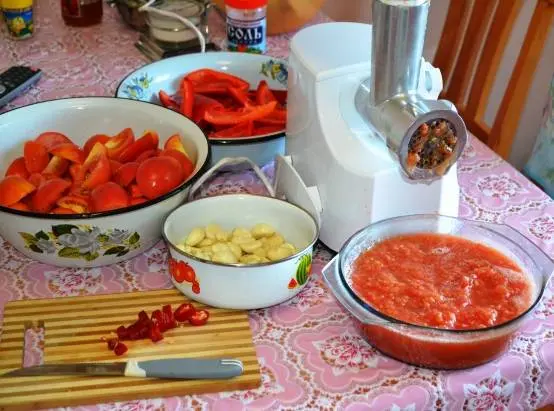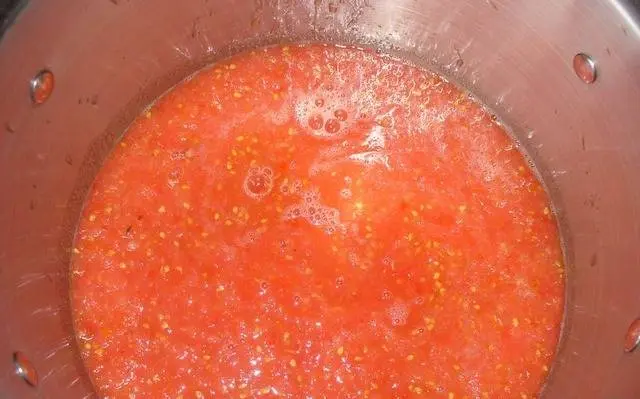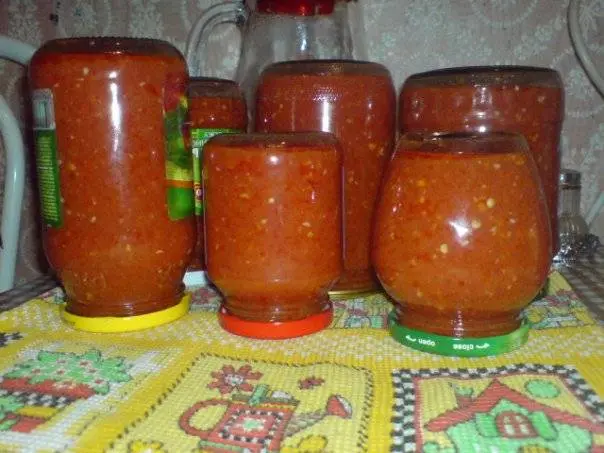It is rare that a hostess can resist a new unusual recipe, especially when it comes to preparations for the winter. After all, in autumn, when there are a lot of fruits and especially vegetables not only in the markets, but also in your own garden, you want to use all the numerous gifts of nature with benefit. Only a few months will pass and all the same products will have to be bought at exorbitant prices, and their taste will no longer be the same as that of freshly harvested products from the garden. Therefore, in this fertile autumn time in any house in the kitchen every day they try to use it to good use, preparing something tasty and, of course, healthy for the winter.
A dish like Zamanikha adjika, by its name alone, beckons you to try cooking it. And if you try it once, then, most likely, the recipe for this seasoning snack will be included in the list of your favorite preparations for the winter for a long time.

ÐžÑ Ð½Ð¾Ð²Ð½Ñ
Only the freshest and ripest vegetables, especially tomatoes and peppers, are used to make Zamanihi adjika. It is thanks to this that adjika gets its unique and attractive taste, despite even long-term heat treatment.
Collect on your site or purchase the following products from the market:
- Tomatoes – 3 kg;
- Sweet bell pepper – 1 kg;
- Hot pepper – depending on the taste of spicy lovers – from 1 to 4 pods;
- 5 heads of rather large garlic;
- Salt – 2 tablespoons;
- Sugar – 1 cup (200 ml);
- Vegetable oil – 1 cup.

All vegetables must be thoroughly cleaned of dirt, washed, and then dried. Tomatoes are peeled from the stalks, both types of pepper – from the seed chambers, inner valves and tails.
Garlic is freed from scales and is divided into white beautiful smooth cloves.
Features of cooking adjika
First of all, the tomatoes are cut into small pieces and passed through a meat grinder. Oil is poured into a saucepan with a thick bottom, brought to a boil, and a fragrant tomato mass is added there along with salt and sugar. Everything mixes very well. Tomatoes chopped in a meat grinder with spices are stewed over medium heat for about one hour.

While the tomatoes are boiling over the fire, you can do the rest of the ingredients. Peppers, both sweet and hot, are cut into small pieces and also crushed with a meat grinder. In the same way, all garlic is passed through a meat grinder with them.
An hour after boiling the tomatoes, chopped peppers and garlic are added to the pan, after which the fragrant vegetable mixture is boiled for another 15 minutes. Adjika “Zamanikha” is ready. To save for the winter, it must be laid out hot in sterile small jars and immediately rolled up.

When you make adjika according to this recipe for the first time, it is best to put a little of the finished product in a separate bowl and wait until it cools completely, and then just try. After cooling, the taste of the seasoning changes.
Adjika “Zamanikha” is a wonderful seasoning for most meat dishes, as well as for pasta, potatoes, cereals. Moreover, it will be quite in demand as an independent snack.









